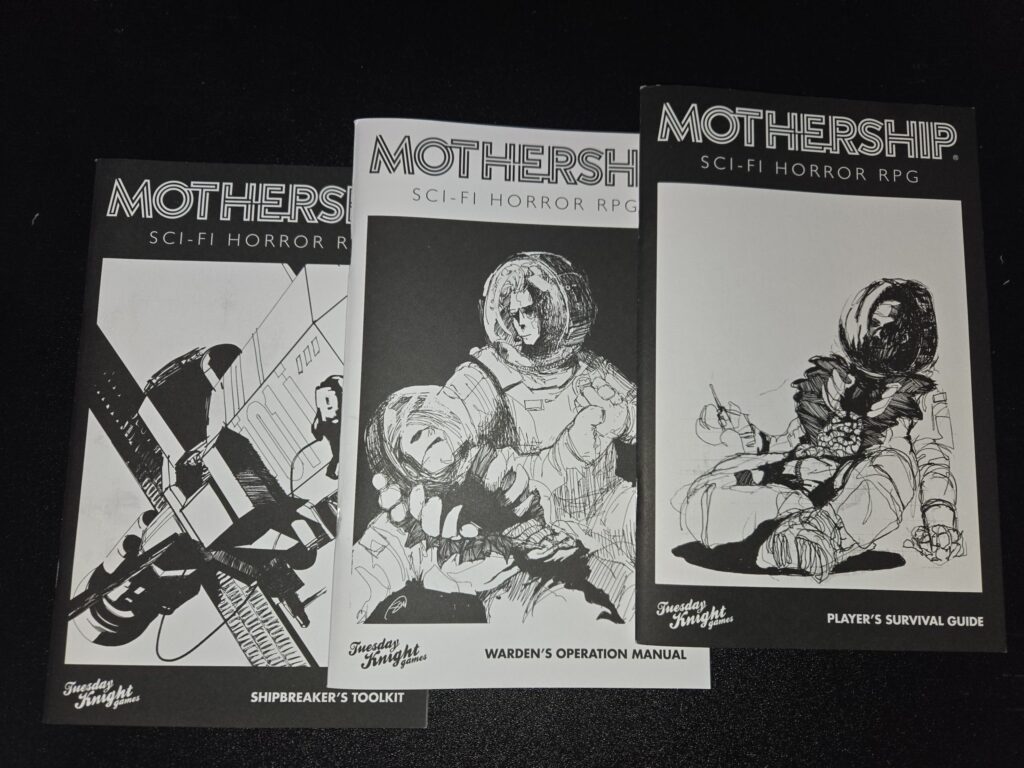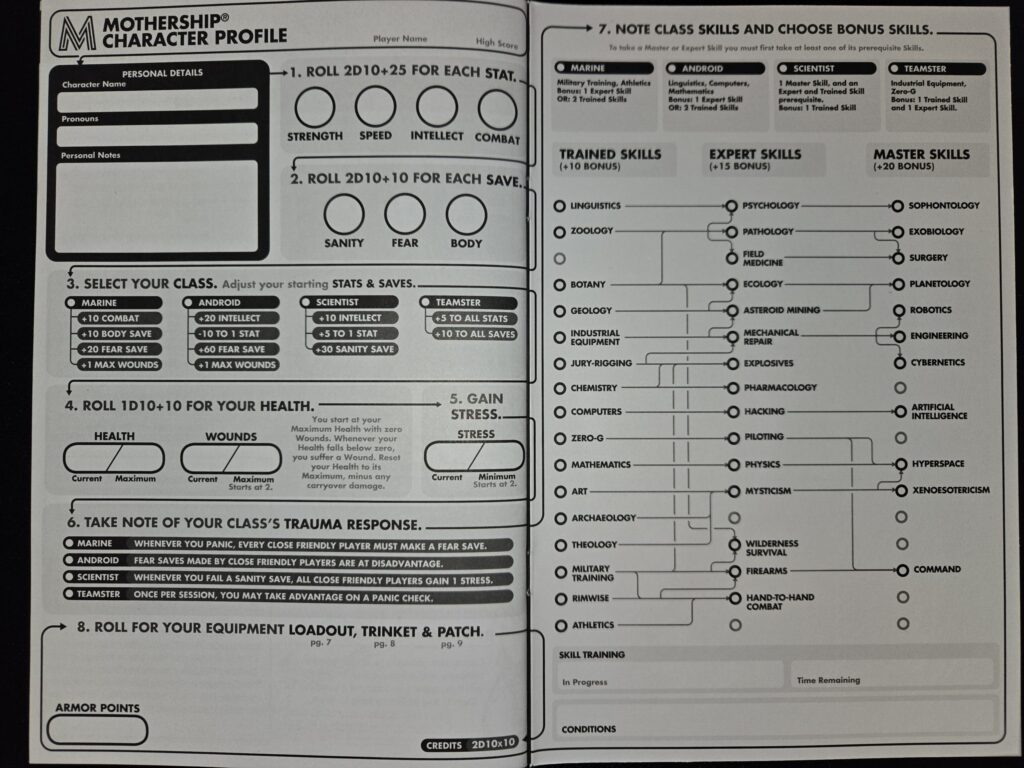Overall – 4.5/5 Skulls

Materials and Resources
The Player’s Survival Guide is the primary book needed to play the game and is offered free on the Tuesday Knight Games website in PDF form. This book is very well laid out to make initial learning and quick reference as quick and easy as possible. The back cover doubles as a cheat sheet during play.
The Warden’s Operations Manual is the book used by the game master of the game (Warden). This book really shines and is easily one of the best manuals for running story driven suspense and horror narratives. It has solid guidance that apply across systems and really dials in the best way to play situations in Mothership specifically. Even if you never play Mothership, this book is worth a read.
The supplemental books: Shipbreaker’s Toolkit, Unconfirmed Contact Reports, and Pre-built Modules are all optional, but again well thought through. Formatting is solid and the content is useful. Shipbreaker’s Toolkit is a great addition for longer form campaigns as it adds rules for ship customization and advancement. Unconfirmed Contact Reports gives a non-functional description of many possible space horror options to get the Warden creative juices moving for custom locations. Pre-built Modules like Another Bug Hunt and the many one-shot trifold brochures are really valuable to see how structuring notes for a game can be done. They focus on being complete, but minimalistic and isolate the functional needs while paying enough attention to lore and vibe text.
The mobile app for Mothership offers quick and easy automation that makes playing require minimal preparation time and character creation can be done within 15 minutes. Most of the prep will be done creating the digital version of the location map if you intend to use that aspect of the application, which is optional but very helpful.
Tuesday Knight Games website is intuitive and provides easy navigation to resources for getting started with Mothership. There is also an area for links to actual play videos by third parties and a store for purchasing additional resources.

Gameplay Experience
The game flows well and the modules are structured to be minimalistic, but complete enough to be easily run by the Warden. This game lends itself very well to a grab-and-go playthrough, especially if everyone in your group has the mobile app. Social encounters are tense due to the situations they typically fall into. Investigation feels organic because everything in the game relies on what the players choose to focus on and how they decide to interact with those things. Story is surprisingly good as the Warden’s Operation Manual encourages a certain cadence of revelation that makes the game unfold dramatically despite the lack of fantastical descriptions in the game locations.
As Players
Many games in this genre have a pretty high entry bar with a steep learning curve. As long as the player is familiar with the sci-fi horror genre of film or literature, this game has a very low entry bar with a nuanced learning curve. This game is quick to start and slow to master. There is a lot of nuance that can be introduced with the various available equipment, ships, hirelings, and potential behind the high score system. But you can easily just take everything at face value and still have a fantastic time.
As Warden
Like with most TTRPG style games with a single person playing referee and world arbiter, the Warden (game master) has the most to learn at the entry point. A Warden in this game needs to be a little organized and have a decent sense of realism. A sense of dramatic horror and suspense is a big help, but if running a pre-built module this is probably just icing on the cake. Improvising a full scenario is not recommended from our playthrough. This game really shines with a little preparation and thought put into the mystery and the scenario locations. That said, someone comfortable in the genre and versed in the mechanics could easily spin up situations and locations on the fly and it would play magnificently.
System Mechanics
This is a system that tries to only be a few specific things within a very specific genre of gaming and it does all of them incredibly well. There are simple rules and stats around the aspects of play that impact the overall experience. Only that which is necessary is given a true rule. Outside of that minimalistic approach, there is so much freedom to manifest these rules within a world and lore of your choosing that makes it feel vast. There is often guidance in the pre-built modules if you want it, but the system doesn’t trap you in its rules and it also doesn’t leave you to guess where it counts. There is a limited set of guidance around social interactions and running NPCs that forces the player group to be more roleplay heavy to make it work, which I do consider a gap in the system itself, but it works well nonetheless.
Stats, Saves, and Skills
The system math is elegantly done. The skills provide context for actions possibly being taken within the intended settings and feel just big enough to make different characters feel specialized. Stats and Saves are varied from character to character and can be incredibly difficult with fully randomized characters, so the bump from applicable skills can be the difference between a big win and a painful win. Some systems tend to make failure a divergence from the narrative, but Mothership manages to provide the guidance of failing forward. Oftentimes, missing your roll just means that the thing that happens has consequences rather than boons. You will almost always succeed to some extent, but some successes will put you in death’s embrace while others will raise you onto the champion’s pedestal. It’s a rollercoaster ride that I would buy tickets to every hour of the day and night.
Combat
This feels dangerous and epic. You feel powerless and like anything could happen. I really encourage leaning into the concept of having all the players describe what they want to do before resolving the round for the players. Grant advantage and disadvantage accordingly and make sure they understand the possible consequences of their choices before they commit. This will encourage them to start working together and will offer some really cool synergizing, especially when things feel hopeless; which they often will.
Equipment
The equipment feels meaningful, but does not lend to an overpowering of the players. Often, the subject of the scenario has such varied strengths and weaknesses, some equipment that seems mundane will often shine where that which seems glamorous will prove nearly useless. It can feel really good to have just the right thing to deal with the situation but it doesn’t feel too punishing to be missing certain equipment unless the Warden makes it punishing on purpose. The trinkets add flair to a character and can also be functional sometimes, which is pretty cool.
Setting
The setting kind of speaks for itself. It is pretty plainly based on the original Alien movies to some extent and that’s a great movie series to start with to get in the right headspace. But it doesn’t stop there. This setting is dark, dingy, and everything is just waiting for the other shoe to drop. It is never a matter of if something will go horribly wrong, but when, and that sense of dreaded anxiety doubles as a playful excitement. You may die, but you’ll have a great time doing it.
The system does not provide much in the way of true universe lore, but does provide some constants and guidance around how you might approach this aspect of world building in the Warden’s Operations Manual.
NPC Social Interactions
NPCs and social interactions are a bit light in mechanical goodness and rely heavily on the creativity of the Warden. That said, NPCs are very often integral to driving the mystery forward. I do wish there was a bit more guidance with these as I tend to lean into the camp of mechanics driving narrative, but I was pleasantly surprised how organic it felt to just play the NPCs according to their defined function and role in the setting.
The best way I can describe it is that the NPC just felt like another part of the scenario and not like separate entities needing separate rules. They just exist within the setting and will respond according to their role motivation, which is an obstacle all its own without much need for nuanced rules systems.
Players that do not prefer to have an actual social interaction with the Warden may dislike this or struggle with it. Also, Wardens without much social awareness may struggle to run NPCs in this system. There is guidance on how to do this in the Warden’s Operations Manual that you can lean on for the latter, but mileage will vary.
Party dynamics
The sheer danger of the scenarios will bond the party. Survival is going to be a real struggle so it isn’t in the best interest of the players to lean too hard into the character method acting. You really do have to work together to figure out what is going on and how to get through it as unharmed as possible. The Trauma Response mechanic keeps things interesting and changes the dynamic as well. There is bound to be a little strife as some will choose to cautiously remove themselves from danger while others will tilt forward head first. Different scenarios will reward different behaviors, so I think it all balances. There is no one survival strategy that will work for every game.




